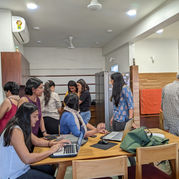ABOUT FCA
The Feminist Collective in Architecture was conceived with the intention of mobilizing professionals, academicians and students to discuss and act upon issues of gender inherent in the discipline and the profession. What began as a series of informal discussions over a few months, became a collective in March 2021. Initiated by Madhavi Desai, Urvi Desai, Miki Desai, Himani Vinodrai and Priyanshi Pathak, FCA has now grown into a vibrant community of feminists collectively working towards the cause. Members of the collective meet on a regular basis and organize activities to initiate conversations on gender bias and challenges in the field.
The Collective aims to create and expand spaces for non cis-males in architecture, primarily in India, but also beyond. By doing so, it strives to promote gender equity and gender richness in the discipline of architecture. It is a platform for bringing together people, skills, resources and research; generating ideas, debates and discussions, and providing support to advance the status of marginalised genders and identities.
We reach out to every feminist (belonging to any gender) committed to the cause of gender equity in architecture and invite you to join the Collective. As a group that seeks to eradicate the various forms of patriarchal oppression, discrimination and gender inequity in the field of architecture, we particularly welcome anyone who has experienced it, in any form or measure, to become part of the Collective and join the efforts to overcome them. Similar initiatives exist at global level, for example, in Europe, USA and Australia, but are largely missing in South Asian countries. This is an attempt to begin small with a hope to spread it further for the good of all.






















